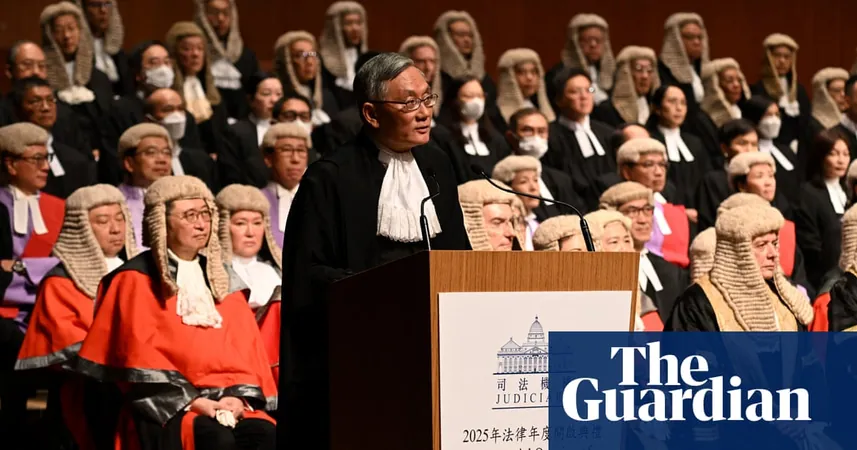
Hong Kong's Chief Justice Alleges 'Orchestrated Harassment' Driving Foreign Judges Away
2025-01-21
Author: Wai
Hong Kong's Chief Justice Alleges 'Orchestrated Harassment' Driving Foreign Judges Away
In a striking address at the ceremonial opening of Hong Kong’s legal year, Chief Justice Andrew Cheung asserted that the recent wave of resignations among foreign judges can be attributed to "escalating geopolitical tensions" and what he termed "orchestrated harassment". His comments underscore the pressing issues facing Hong Kong's judiciary in the wake of the controversial National Security Law (NSL) imposed by Beijing in 2020.
Critics argue that the NSL, enacted following the pro-democracy protests of 2019, has severely stifled dissent and compromised the autonomy of Hong Kong's legal framework, which historically has operated under a common law system distinct from mainland China. The law has faced international condemnation as being overly expansive and punitive, with several high-profile cases raising questions about fairness and due process.
Cheung’s speech acknowledged the “significant challenges” confronting the legal system but staunchly defended its integrity, claiming that the judiciary remains “transparent, fair, and independent.” Notably, he pointed to the dwindling presence of foreign judges on the Court of Final Appeal; of the 15 foreign judges who once served, only six remain following the resignation of several high-ranking judicial figures.
High-profile departures include British Lord Jonathan Sumption, who cited a "profoundly compromised" rule of law as his reason for leaving. In an opinion piece for the Financial Times, he described the gradual transformation of Hong Kong into a "totalitarian state." His statements resonate with a broader frustration expressed by legal experts and foreign observers who view the NSL as an instrument of political suppression.
During his speech, Cheung remarked on the “unfortunate” exits of these judges while insisting that it is not emblematic of a weakened judiciary. He noted that there is now an adequate supply of experienced local judges to fulfill the roles in Hong Kong's courts. However, he conceded that the departures were notably influenced by "political and other considerations," hinting at the external pressures placed on those serving in a highly politicized environment.
Furthermore, while Cheung refrained from detailing the specific harassment faced by overseas judges, reports from pro-democracy and human rights groups have highlighted a coordinated campaign to pressure these judges to resign. Activists argue that the presence of foreign judges lends an air of legitimacy to what they view as a politicized legal system, mobilizing efforts to encourage their departure in hopes of confronting legal injustices in the territory.
As the judiciary in Hong Kong continues to navigate an increasingly complex and fraught political landscape, the impact of these events remains to be seen. The international community is closely watching to assess how the legal structure in this former British colony will evolve under the shadow of extensive state control.



 Brasil (PT)
Brasil (PT)
 Canada (EN)
Canada (EN)
 Chile (ES)
Chile (ES)
 Česko (CS)
Česko (CS)
 대한민국 (KO)
대한민국 (KO)
 España (ES)
España (ES)
 France (FR)
France (FR)
 Hong Kong (EN)
Hong Kong (EN)
 Italia (IT)
Italia (IT)
 日本 (JA)
日本 (JA)
 Magyarország (HU)
Magyarország (HU)
 Norge (NO)
Norge (NO)
 Polska (PL)
Polska (PL)
 Schweiz (DE)
Schweiz (DE)
 Singapore (EN)
Singapore (EN)
 Sverige (SV)
Sverige (SV)
 Suomi (FI)
Suomi (FI)
 Türkiye (TR)
Türkiye (TR)
 الإمارات العربية المتحدة (AR)
الإمارات العربية المتحدة (AR)